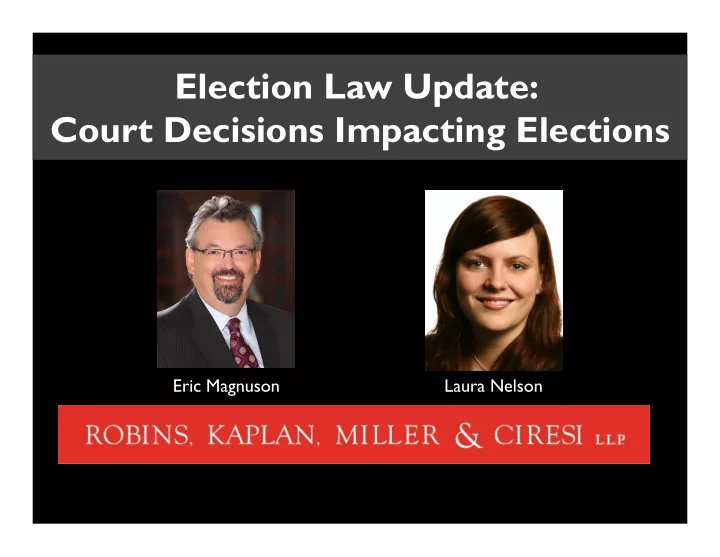

Election Law Update: Court Decisions Impacting Elections Eric Magnuson Laura Nelson
Pre-Roberts’ Court...
Buckley v. Valeo (1976) Upholds contribution limits on the basis of the government's "compelling interest" in preventing political corruption or its appearance.
First National Bank of Boston v. Bellotti (1978) Corporations have a First Amendment right to make contributions to ballot initiative campaigns.
California Medical Association v. FEC (1981) Upholds limits that prevented individuals and unincorporated associations from contributing more than $5,000 per calendar year to any multicandidate political committee.
FEC v. Massachusetts Citizens for Life (1986) Ban on corporate spending in connection with federal elections, was unconstitutional as applied to certain independent expenditures made by nonprofit corporations.
Austin v. Michigan Chamber of Commerce (1990) Upholds prohibition on corporations using treasury money to make independent expenditures to support or oppose candidates in elections.
Nixon v. Shrink Missouri Government PAC (2000) Upholds state limits on campaign contributions to state offices.
FEC v. Colorado Republican Federal Campaign Committee (2001) Upholds the constitutionality of coordinated expenditure limitations imposed on political parties.
Republican Party of Minnesota v. White, 536 U.S. 765 (2002) Ban on candidates for judicial office announcing their views on disputed legal issues and political views is unconstitutional.
FEC v. Beaumont (2003) Upholds ban on corporate contributions to federal candidates is constitutional, even when applied to nonprofit advocacy corporations.
McConnell v. FEC (2003) Upholds the constitutionality of the Bipartisan Campaign Reform Act of 2002.
Roberts’ Court
Randall v. Sorrell (2006) Striking down Vermont’s contribution limits—noting that limits might be permissible if they were "closely drawn" to match a "sufficiently important interest."
FEC v. Wisconsin Right to Life (2007) Issue ads may not be banned from the months preceding a primary or general election.
Davenport v. Washington Education Association (2007) Upheld state requirement for public-sector unions to receive affirmative authorization from a non-member before spending that nonmember's agency fees for election-related purposes.
Davis v. FEC (2008) Striking down the Millionaire Amendment, as no important governmental interest was advanced, because a reliance on personal expenditures reduces the likelihood of corruption.
Caperton v. A.T. Massey Coal Co., Inc. (2009) Due Process requires a judge to recuse himself when the judge has an economic interest in the outcome of the case, but also when "extreme facts" create a "probability of bias."
Citizens United v. FEC (2010) First Amendment prohibits the government from restricting political independent expenditures by corporations, associations, or labor unions.
Arizona Free Enterprise Club Freedom Club PAC v. Bennett (2011) Striking down Arizona's matching funds scheme, which provides additional funds to a publicly funded candidate when expenditures by a privately financed candidate and independent groups exceed the funding initially allotted to the publicly financed candidate.
American Tradition Partnership v. Bullock (2012) Reversing without argument a Montana Supreme Court ruling which upheld the state’s prohibition on corporate financing in elections despite the Citizens United decision.
McCutcheon v. FEC (2014) Struck down the biennial aggregate limit on individual contributions to national party and federal candidate committees.
In the wake of the Roberts’ Court...
New York Progress & Prot. PAC v. Walsh, 2014 U.S. Dist LEXIS 57477 (S.D.N.Y. Apr. 24, 2014) “Indeed, today’s reality is that the voices of we the people are too often drowned out by the few who have great resources.. . . ‘But this Court is bound to apply this definition no matter how misguided . . . [the Court] may think it to be.’”
Wis. Right to Life, Inc. v. Barland, 2014 U.S. App. LEXIS 9015 (7th Cir. May 14, 2014) “Certain statutory provisions—the ban on corporate political spending and the cap on the amount a corporation may spend to raise money for an affiliated PAC—are obviously unconstitutional under Citizens United”
Seaton v. Wiener, 0:14-cv-01016- DWF-JSM (D. Minn. May 19, 2014) “Although the undersigned may not agree with the Supreme Court’s recent line of cases on the subject of campaign finance, and their effect on the integrity of our public governmental institutions, the Court acknowledges that it is nevertheless bound by the decisions of the Supreme Court.”
Questions?
FIN
Recommend
More recommend